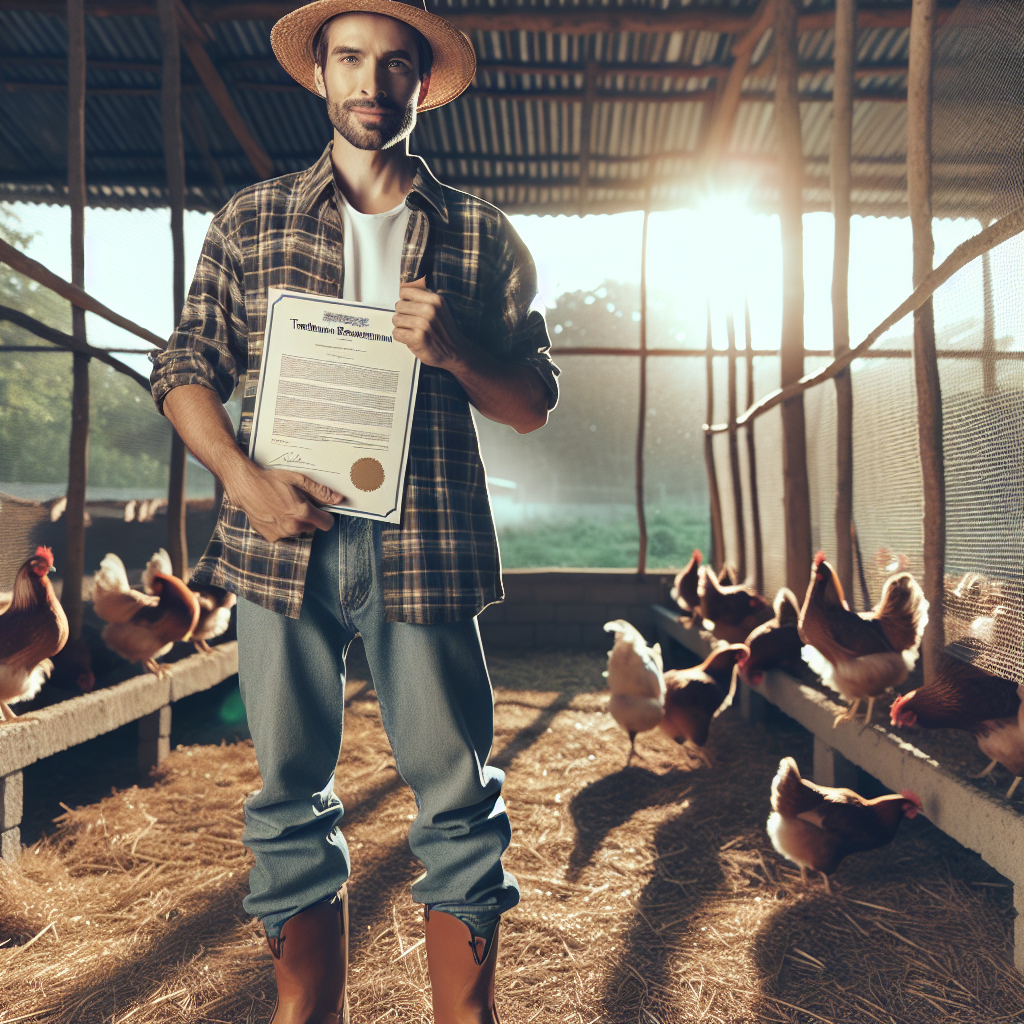In the fast-paced world of the poultry sector, ensuring ethical practices and abiding by business regulations is of utmost importance. But how can you, as an individual or business owner, guarantee that your operations uphold the highest standards? This article will explore key strategies and considerations for navigating the complex landscape of ethical practices in the poultry industry, providing you with valuable insights and practical tips to ensure compliance and promote responsible business conduct. With a friendly tone and practical approach, we aim to equip you with the knowledge and tools needed to make a positive impact in this vital sector.
Understanding Ethical Practices in the Poultry Sector
Definition of ethical practices
Ethical practices in the poultry sector refer to the responsible and humane treatment of poultry, ensuring their well-being and welfare throughout their lives. It involves taking into consideration the physical, emotional, and behavioral needs of the birds and implementing practices that align with ethical considerations.
Importance of ethical practices
Ethical practices are vital in the poultry sector for several reasons. Firstly, they uphold the values of compassion and respect for the animals under our care. It is our moral duty to provide a safe and comfortable environment for poultry to thrive in.
Moreover, consumers are increasingly concerned about the treatment of animals and are actively seeking out products that are sourced ethically. Adopting ethical practices can help companies build trust and loyalty with consumers, ultimately benefiting their bottom line.
Lastly, ethical practices contribute to the overall sustainability of the poultry industry. By prioritizing animal welfare, businesses can enhance productivity, minimize health risks, and reduce environmental impact.
Relationship between ethical practices and business regulations
Ethical practices and business regulations are closely intertwined. While ethical practices are guided by principles of compassion and responsibility, business regulations set legal standards that must be adhered to. These regulations ensure that ethical practices are followed consistently and provide a framework for the poultry sector to operate within.
Complying with business regulations not only ensures that a company is acting ethically but also protects the welfare of animals, workers, and consumers. It fosters accountability within the industry and maintains a level playing field for all stakeholders.
Complying with Business Regulations in the Poultry Sector
Understanding relevant business regulations
Compliance with business regulations is crucial in the poultry sector to ensure that operations are conducted in a legal and ethical manner. Key regulations include those related to animal welfare, food safety, labor laws, environmental impact, and marketing practices. Familiarizing yourself with these regulations is the first step towards compliance.
Importance of compliance
Complying with business regulations serves several purposes. Firstly, it guarantees that the poultry industry operates within the boundaries of the law, minimizing the risk of penalties, fines, or legal actions. Secondly, it protects the well-being of animals, employees, and consumers by setting standards that prioritize their safety and rights.
Furthermore, compliance fosters trust and credibility with consumers, who are increasingly conscious of the ethical implications of their purchases. By meeting legal requirements, businesses can differentiate themselves as responsible and reliable providers in the market.
Consequences of non-compliance
Non-compliance with business regulations in the poultry sector can have severe consequences. Legal penalties, fines, and sanctions can be imposed on businesses that fail to meet the required standards. In addition, non-compliance can result in damage to the reputation and credibility of a company, leading to a loss of customers and business opportunities.
Moreover, non-compliance poses risks to animal welfare, employee health, and consumer safety. It can lead to the spread of diseases, environmental pollution, compromised food quality, and unfair labor practices. Therefore, it is crucial for businesses in the poultry sector to prioritize compliance with regulations to avoid these adverse outcomes.
Promoting Animal Welfare
Providing appropriate living conditions for poultry
Ensuring appropriate living conditions for poultry is fundamental to their welfare. This includes providing sufficient space, natural lighting, proper ventilation, and suitable temperature control within poultry farms. The housing should be designed to minimize stress, injuries, and disease transmission.
Avoiding overcrowding in poultry farms
Overcrowding is detrimental to the health and well-being of poultry. It can lead to increased aggression, stress, and the spread of diseases. To promote animal welfare, it is crucial to avoid overcrowding and provide adequate space for the birds to move, exercise, and exhibit natural behaviors.
Ensuring access to clean water and nutritious food
Access to clean water and nutritious food is essential for the health and growth of poultry. Regularly providing fresh and clean water helps prevent dehydration and ensures proper digestion. Similarly, offering a balanced diet that meets the nutritional needs of the birds is vital for their overall well-being.
Implementing humane slaughter practices
Humane slaughter practices are a crucial aspect of ethical practices in the poultry sector. Implementing methods that minimize pain, stress, and fear during the slaughter process is essential. Using approved stunning methods, ensuring rapid and efficient killing, and providing a calm and controlled environment all contribute to humane slaughter.
Ensuring Food Safety
Implementing proper hygiene and sanitation practices
Maintaining proper hygiene and sanitation practices is essential to ensure food safety in the poultry sector. This includes regular cleaning and disinfection of facilities, equipment, and transport vehicles. Proper waste disposal, pest control measures, and adherence to personal hygiene protocols for workers are also vital.
Monitoring and managing feed quality
Ensuring the quality and safety of poultry feed is crucial to prevent the contamination of poultry products. Regular monitoring and testing of feed ingredients, storage conditions, and production processes help identify and mitigate any potential risks. Implementing strict quality control measures and sourcing feed from trusted suppliers are also important in maintaining feed safety.
Proper waste and manure management
Proper waste and manure management are necessary to minimize environmental pollution and prevent the transmission of diseases. Establishing efficient systems for waste collection, treatment, and disposal is essential. This can include composting, anaerobic digestion, or other sustainable methods that minimize the impact on the environment.
Regular veterinary inspections and tests
Regular veterinary inspections and tests play a crucial role in ensuring the health and safety of poultry. These inspections help identify any potential diseases or health issues early on, enabling prompt intervention and treatment. Implementing an effective veterinary monitoring program helps maintain the overall well-being of the birds and ensures the safety of their products.
Implementing Fair Labor Practices
Complying with labor laws and regulations
Compliance with labor laws and regulations is essential for promoting fair labor practices in the poultry sector. This includes providing fair wages, benefits, and working conditions to employees, as well as adhering to regulations related to working hours, overtime, and workplace safety.
Providing fair wages and benefits to employees
Ensuring that employees in the poultry sector receive fair wages and benefits is a crucial aspect of ethical practices. Fair compensation helps motivate and retain skilled workers, contributing to the overall productivity and success of a company. Additionally, providing benefits such as healthcare, retirement plans, and opportunities for professional development improves the overall well-being of employees.
Ensuring a safe and healthy working environment
Creating a safe and healthy working environment is essential for the well-being and morale of employees in the poultry sector. This includes implementing safety protocols, providing appropriate personal protective equipment, and offering training to prevent injuries and accidents. Regular maintenance of facilities and equipment is also crucial to ensure a safe working environment.
Preventing discrimination and ensuring equal opportunities
Promoting diversity, preventing discrimination, and ensuring equal opportunities for all employees is a fundamental aspect of fair labor practices. Businesses in the poultry sector should foster an inclusive work environment that values and respects the diversity of their workforce. Implementing policies and practices that prevent discrimination based on gender, race, religion, or any other protected characteristic is essential.
Responsible Use of Antibiotics and Medications
Developing and following a veterinary treatment plan
Responsible use of antibiotics and medications in the poultry sector requires the development and implementation of a veterinary treatment plan. This plan should outline the conditions under which antibiotics or medications are necessary, define the appropriate dosage and administration methods, and specify any withdrawal periods before the birds’ products can be used for consumption.
Ensuring proper dosage and administration
Proper dosage and administration of antibiotics and medications are essential to prevent antibiotic resistance and ensure the health and welfare of poultry. It is critical to follow veterinary recommendations and avoid the misuse or overuse of antibiotics. Accurate dosing and correct administration methods should be strictly adhered to.
Adhering to withdrawal periods
Adhering to withdrawal periods is crucial to ensure that poultry products are free from antibiotic residues before entering the consumer market. Withdrawal periods are the designated time required for the medication to leave the animal’s system completely. Strictly adhering to these periods helps maintain the safety and integrity of poultry products.
Recording and reporting antibiotic use
Keeping detailed records of antibiotic use is important for accountability and traceability. Regularly recording and reporting antibiotic use helps monitor the frequency and types of medications used, enabling proper evaluation and management of antibiotic use. Transparency in reporting antibiotic use builds trust with consumers and demonstrates a commitment to responsible practices.
Reducing Environmental Impact
Implementing sustainable farming practices
Implementing sustainable farming practices in the poultry sector is essential to reduce the industry’s environmental impact. This can include utilizing energy-efficient equipment, utilizing renewable energy sources, and implementing water conservation measures. Sustainable farming practices also involve minimizing the use of chemicals and fertilizers to protect soil and water quality.
Minimizing water and energy consumption
Minimizing water and energy consumption is crucial to reduce the environmental footprint of the poultry sector. This can be achieved through the use of efficient irrigation systems, recycling and reusing water, and implementing energy-saving technologies. Conservation measures, such as using natural light and ventilation, can also contribute to reducing energy consumption.
Proper waste management and disposal
Proper waste management and disposal are vital in minimizing environmental pollution caused by the poultry sector. Implementing systems for efficient waste collection, separation, and treatment help prevent contamination of soil and water resources. Recycling and utilizing waste products for beneficial purposes, such as composting or bioenergy production, can also contribute to reducing environmental impact.
Reducing greenhouse gas emissions
The poultry sector can play a significant role in reducing greenhouse gas emissions through various measures. These include optimizing feed formulations to reduce methane emissions from animal digestion, implementing energy-efficient technologies, adopting renewable energy sources, and managing waste and manure effectively. Investing in emission reduction strategies can contribute to mitigating climate change.
Ensuring Transparency and Traceability
Maintaining accurate records of operations and activities
Maintaining accurate records of operations and activities is essential for transparency and traceability in the poultry sector. These records can include information on feed sources, medication use, veterinary treatments, slaughter processes, and other relevant activities. Accessible and detailed records enable effective monitoring, evaluation, and audit processes.
Implementing batch and product traceability systems
Implementing batch and product traceability systems allows for the identification and tracking of poultry products throughout the supply chain. This enables swift and targeted responses in case of product recalls or safety concerns. Traceability systems enhance transparency, build trust with consumers, and promote accountability among stakeholders.
Regular audits and inspections
Regular audits and inspections play a vital role in ensuring compliance with ethical practices and business regulations. Audits assess the implementation and effectiveness of policies and procedures, while inspections verify that standards are being met in practice. These processes help identify areas for improvement, address any deviations, and ensure continuous adherence to ethical and regulatory requirements.
Making information accessible to consumers
Providing consumers with accessible and accurate information about the production, sourcing, and quality of poultry products is essential for transparency. This can be achieved through clear labeling, product certifications, and online platforms that highlight the ethical practices followed. Open communication and engagement with consumers help build trust and empower them to make informed purchasing decisions.
Promoting Ethical Marketing and Labeling
Avoiding false or misleading claims on packaging and promotional materials
Ethical marketing and labeling involve avoiding false or misleading claims on packaging and promotional materials. Businesses in the poultry sector should accurately represent their products, their sourcing methods, and the ethical practices they follow. Clear and transparent communication builds trust with consumers and avoids deceptive marketing practices.
Obtaining appropriate certifications and accreditations
Obtaining appropriate certifications and accreditations reinforces a company’s commitment to ethical practices. Certifications, such as organic, free-range, or animal welfare certifications, provide assurance to consumers that certain standards have been met. Seeking accreditation from reputable organizations helps verify a company’s adherence to ethical guidelines and differentiates them in the market.
Providing accurate and transparent information to consumers
Providing accurate and transparent information to consumers is fundamental in promoting ethical practices in the poultry sector. Companies should disclose relevant details about their production processes, sourcing methods, animal welfare practices, and environmental impact. Transparent communication builds trust, fosters informed consumer choices, and supports the demand for ethically produced poultry products.
Promoting honest and fair competition
Promoting honest and fair competition in the poultry sector contributes to ensuring ethical practices. Businesses should compete based on the quality of their products, the adherence to ethical standards, and the innovation they bring to the market. Fair competition encourages continuous improvement, drives innovation, and benefits both consumers and the entire industry.
Continuous Improvement and Monitoring
Establishing internal systems for monitoring and evaluation
Establishing internal systems for monitoring and evaluation is crucial for continuous improvement in ethical practices. Regularly assessing the implementation and effectiveness of policies, protocols, and procedures allows for timely identification of areas for improvement. Collecting and analyzing data related to animal welfare, environmental impact, and compliance helps set benchmarks and track progress over time.
Regularly reviewing and updating ethical practices
Regular review and update of ethical practices ensure that they remain relevant, effective, and aligned with evolving industry standards and consumer expectations. Ongoing assessment of new research, technologies, and best practices allows businesses to adapt and improve their ethical practices. Collaboration with experts, industry associations, and regulatory bodies can provide valuable insights in this continuous improvement process.
Investing in research and innovation
Investing in research and innovation is essential to drive the advancement of ethical practices in the poultry sector. Research helps identify new approaches, technologies, and solutions that can improve animal welfare, reduce environmental impact, and enhance overall sustainability. Embracing innovation and adopting new methods supports continuous improvement and keeps businesses at the forefront of ethical practices.
Encouraging feedback and suggestions from stakeholders
Engaging with stakeholders, including employees, consumers, suppliers, and community members, is vital for fostering a culture of continuous improvement. Encouraging feedback, suggestions, and open dialogue helps identify blind spots, challenges, and potential areas for improvement. Actively involving stakeholders in decision-making processes promotes transparency and inclusivity, enhancing the overall effectiveness of ethical practices.




